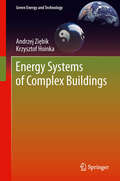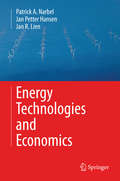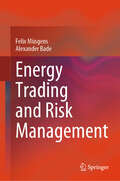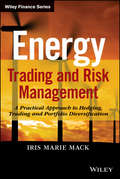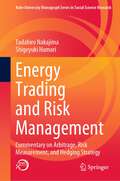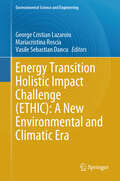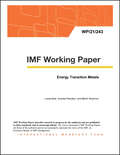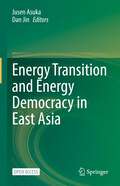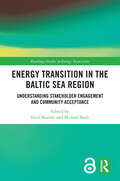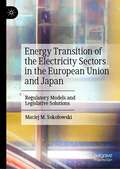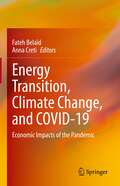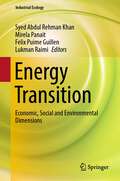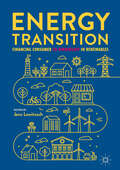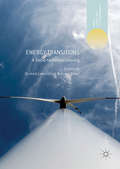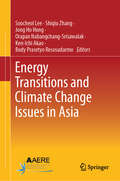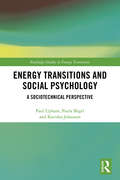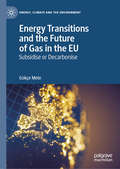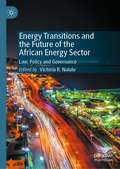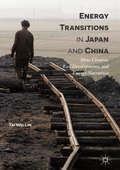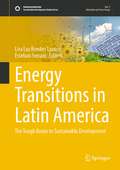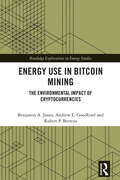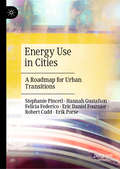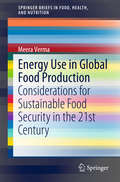- Table View
- List View
Energy Systems of Complex Buildings
by Andrzej Ziębik Krzysztof HoinkaThe production and consumption of energy carriers in complex buildings take place within the network of interconnected energy processes. For this reason, a change carried out in one energy process influences other energy processes. Therefore, all balance equations of energy carriers should be investigated as a whole, and energy management of complex buildings creates a large energy system with internal relationships between energy installations and the equipment, as well as external relationships with the environment. Energy Systems of Complex Buildings presents the system approach to the energy-ecological analysis of energy management in complex buildings. Mathematical models of balancing the direct energy consumption, as well as cumulative energy consumption and cumulative emission of noxious substances are based on input-output analysis. Algorithms devoted to system analysis in the exploitation of energy management of complex buildings are included. In the case of ecological analysis, a new approach is presented basing on the idea of thermoecological costs. In this way, two groups of noxious influence (depletion of non-renewable energy resources and emissions of noxious substances) are taken into account. The LCA energy-ecological analysis of complex buildings has also been presented. Students, building designers, energy auditors, and researchers will learn the methodology of evaluating the energy and ecological effects by applying new technologies and devices in buildings, which influence future investigations concerning the energy and ecological analysis of complex buildings.
Energy Technologies and Economics
by Patrick A. Narbel Jan Petter Hansen Jan R. LienThis is an easy-to-read textbook providing the reader with the basis to comprehend the major energy technologies from a physical and economical perspective. The journey through the book begins with some background theory on the physics and economics of energy. Major energy technologies (fossil, nuclear and renewable) are explored in-depth, explaining how they work and the costs involved. Finally, the journey ends by exploring the technical and economic feasibility of supplying the world by 2050 with sustainable energy only. Numerous examples are provided to allow the reader to relate important concepts to real-life. The reader's understanding of the material can then be tested using the exercises at the end of each chapter. This textbook is the first to thoroughly present the physics and the economics of energy. It is intended for graduate students and practitioners interested in the field of energy. It also enables the general reader to distinguish between political statement and fact.
Energy Trading & Hedging: A Nontechnical Guide
by Tom SengThis book focuses primarily on the energy products that are financially traded on the New York Mercantile Exchange: crude oil, natural gas, unleaded gasoline, and heating oil. These commodities are the most common ones used for hedging energy commodity risk.
Energy Trading And Investing: Trading, Risk Management, And Structuring Deals In The Energy Market
by Davis W. EdwardsPower-up your investment portfolio Volatile energy prices and a rapidly changing energy industry provide investment opportunities for savvy investors and dangers for uninformed ones. Natural gas fracking has the raised the concern that the world may be awash in cheap oil and natural gas. A decade of record high temperatures has replaced concerns about shrinking fossil fuel supplies. Alternative energy technologies like batteries, solar, and wind are shaking up utilities. Constant innovation and changing markets remains the hallmark of the energy sector. Written by a leading expert in the energy sector, Energy Trading and Investing, Second Edition covers this exciting market discussing topics that range from traditional and emerging markets to need-to-know financial principles and proven investing strategies. A longstanding veteran of Wall Street trading and the energy sector, Davis Edwards provides detailed information on every topic important to energy investors, including: • Natural gas, electricity, petroleum, coal, weather, and emissions markets • Details on financial products, like futures, forwards, swaps, and options • Deal structuring examples explaining spread options, spatial load forecasting, and tolling agreements • Coverage of specialty electricity markets - capacity, financial transmission rights (FTRs), power purchase agreements (PPAs), and ancillary services • Explanations of natural gas transportation, storage, and swing option contracts • A practical introduction to market risk, credit risk, and model risk management. This hands-on guidebook covers topics for professional traders, individual investors, MBA students, and energy market participants. Jargon from both the financial industry and energy market is fully explained and the math is made accessible to the average reader. Regardless of your background, Energy Trading and Investing will provide you with a comprehensive understanding of energy trading. If you’re a serious trader, you need to understand the energy markets, and Energy Trading and Investing is the only book you need to trade successfully in this vibrant sector.
Energy Trading and Risk Management
by Felix Müsgens Alexander BadeThis book offers important insights into the intricacies of energy trading and risk management to students and professionals in the liberalized electricity and natural gas markets. In its opening chapter, the book delves into fundamental concepts, including price formation on wholesale markets. The various market places and trading products are presented, and the distinguishing characteristics of electricity and natural gas compared to other commodities are emphasised. Moving forward, the next chapter concentrates on portfolio management, offering insights into the trading process through the perspectives of various agents. It begins with proprietary traders and progresses to encompass the portfolio management activities of integrated companies responsible for both generation assets and a retail client base. The book then looks at risk management, explaining the diverse risks that impact the value of energy portfolios inthe market. It places emphasis on credit risk, price risk, quantity risk, and product liquidity risk as the most influential factors and presents effective practices for their management. Furthermore, readers will gain a comprehensive understanding of how to manage quantity risk and its interconnectedness with price risk. Additionally, the book addresses the measurement of product liquidity and its disparities across different energy market products. In summary, this book is an accessible introduction and a concise reference for students and professionals across all fields of energy.
Energy Trading and Risk Management
by Iris Marie MackA comprehensive overview of trading and risk management in the energy markets Energy Trading and Risk Management provides a comprehensive overview of global energy markets from one of the foremost authorities on energy derivatives and quantitative finance. With an approachable writing style, Iris Mack breaks down the three primary applications for energy derivatives markets - Risk Management, Speculation, and Investment Portfolio Diversification - in a way that hedge fund traders, consultants, and energy market participants can apply in their day to day trading activities. Moving from the fundamentals of energy markets through simple and complex derivatives trading, hedging strategies, and industry-specific case studies, Dr. Mack walks readers through energy trading and risk management concepts at an instructive pace, supporting her explanations with real-world examples, illustrations, charts, and precise definitions of important and often-misunderstood terms.From stochastic pricing models for exotic derivatives, to modern portfolio theory (MPT), energy portfolio management (EPM), to case studies dealing specifically with risk management challenges unique to wind and hydro-electric power, the bookguides readers through the complex world of energy trading and risk management to help investors, executives, and energy professionals ensure profitability and optimal risk mitigation in every market climate.Energy Trading and Risk Management is a great resource to help grapple with the very interesting but oftentimes complex issues that arise in energy trading and risk management.
Energy Trading and Risk Management: Commentary on Arbitrage, Risk Measurement, and Hedging Strategy (Kobe University Monograph Series in Social Science Research)
by Shigeyuki Hamori Tadahiro NakajimaThis book introduces empirical methods for analyzing energy markets. Even beginners in econometrics and mathematical finance must be able to learn how to utilize these methodologies and how to interpret the analysis results. This book provides some example analyses of the North American, European, and Asian energy markets. The reader will experience some theories and practices of energy trading and risk management. This book reveals the characteristics of energy markets using quantitative analyses. Examples include unit root, cointegration, long-term equilibrium, stochastic arbitrage simulation, multivariate generalized autoregressive conditional heteroscedasticity (GARCH) models, exponential GARCH (EGARCH) models, optimal hedge ratio, copula, value-at-risk (VaR), expected shortfall, vector autoregressive (VAR) models, vector moving average (VMA) models, connectedness, and frequency decomposition. This book is suitable for people interested in the empirical study of energy markets and energy trade.
Energy Transition Holistic Impact Challenge (Environmental Science and Engineering)
by George Cristian Lazaroiu Mariacristina Roscia Vasile Sebastian DancuThis book states that the new environmental challenge will also have to be faced ethically, science can provide the tools, but people will have to be sensitized so that they make their own environmental ethics. The challenge of the new era is: the environment and therefore the climate, as it does not start outside of us, but as a constituent element of our life and therefore lived ethically. The new vision proposed in this book is to push technology together with the human being, in assuming environmentally ethical behaviors: this is the greatest collective action of humanity. Sustainable development has allowed an integrated key to the social, economic, and environmental dimensions. Through ethics, sustainability can be combined not only by referring to the problem of pollution and the exploitation of natural resources, but it creates a new global era that includes all dimensions of people's lives and of society. The shared and structured environmental ethics allow an approach that is no longer short-term but provide the collective tools to look far in time. With this book, we want to lay the instrumental, technical, social, and legislative foundations, to provide a new methodology for the care of the environment, as up to now, there has been much discussion, but little achieved in a truly ethical way.
Energy Transition Metals (Imf Working Papers)
by Lukas Boer, Andrea Pescatori, and Martin StuermerA report from the International Monetary Fund.
Energy Transition and Energy Democracy in East Asia
by Jusen Asuka Dan JinThis is an open access book.The subject of this book is to provide down-to-earth information on what kind of actions are being taken by the Government, Local community, Businesses, Researchers, NGOs on the energy transition in this region. It gives an updated picture of the energy transition in the East Asian countries, where the economic growth, as well as CO2 emission growth, is significant.This book focuses not only on the technological perspective of the energy transition but also on the relationship between democracy and energy transition. Readers of this book can understand what kind of international support and pressure is needed to promote the energy transition in this region.Since energy transition is needed not only for combatting climate change but also for the Green Recovery from the COVID-19 pandemic, publishing this book is very helpful to promote the Green Recovery and the Green New Deal world-widely.
Energy Transition in the Baltic Sea Region: Understanding Stakeholder Engagement and Community Acceptance (Routledge Studies in Energy Transitions)
by Farid Karimi and Michael RodiThis book analyses the potential for active stakeholder engagement in the energy transition in the Baltic Sea Region (BSR) in order to foster clean energy deployment. Public acceptability and bottom-up activities can be critical for enduring outcomes to an energy transition. As a result, it is vital to understand how to unlock the potential for public, community and prosumer participation to facilitate renewable energy deployment and a clean energy transition – and, consequently, to examine the factors influencing social acceptability. Focussing on the diverse BSR, this book draws on expert contributions to consider a range of different topics, including the challenges of social acceptance and its policy implications; strategies to address challenges of acceptability among stakeholders; and community engagement in clean energy production. Overall, the authors examine the practical implications of current policy measures and provide recommendations on how lessons learnt from this ‘energy lab region’ may be applied to other regions. Reflecting an interdisciplinary approach in the social sciences, this book is an essential resource for scholars, students and policymakers researching and working in the areas of renewable energy, energy policy and citizen engagement, and interested in understanding the potential for bottom-up, grassroots activities and social acceptability to expedite the energy transition and reanimate democracies.
Energy Transition of the Electricity Sectors in the European Union and Japan: Regulatory Models and Legislative Solutions
by Maciej M. SokołowskiThis book provides a comprehensive overview of the energy policies in the European Union and Japan in terms of electricity markets and climate action, including energy efficiency, renewable energy sources, and the reduction of emissions. The book evaluates and compares the regulatory frameworks for achieving energy transitions by answering a number of questions focused on the essence and range of the regulatory models used by leading global economies which herald carbon neutrality by 2050. The book provides a useful framework that systematises Japanese and European energy policies and legislation including electricity-related policies, plans, and programmes. Discussing these issues in relation to the European and Japanese 2050 energy transition the author delves into the four pillars of the transition: market reform, reduction of emissions, promotion of renewables, and enhancing energy efficiency. Each chapter demonstrates the timing of the actions undertaken both in Europe and Japan; analyses the character of the conducted actions, evaluates the stakeholders of the realised agenda; and presents the technologies involved in the energy transition.
Energy Transition, Climate Change, and COVID-19: Economic Impacts of the Pandemic
by Anna Cretì Fateh BelaïdThis volume analyzes the impacts of the COVID-19 pandemic on energy transition and climate change from an economic perspective. Since its emergence in early 2020, the COVID-19 pandemic has had a powerful effect on multiple facets of the global economy. The unknown scope and duration of the pandemic and its associated economic shocks have made energy security and the process of clean energy transition highly unpredictable. To combat this, this edited volume presents a wide range of theoretical and empirical research at the nexus of the COVID-19 pandemic and energy, resource, and environmental economics. Chapters focus on four major themes: the impact of crises on energy security, the role of resilient energy systems in society, the challenges of clean energy transition, and economic impacts of COVID-19 on climate change. Providing rigorous analysis of an evolving situation that will continue to impact the global energy market, this volume will be of interest to researchers and students of energy economics, environmental economics, and resource economics as well as policy professionals involved in climate change and energy transition.
Energy Transition: Economic, Social and Environmental Dimensions (Industrial Ecology)
by Syed Abdul Rehman Khan Mirela Panait Felix Puime Guillen Lukman RaimiThis book opens up a critical dimension of energy transition taking in account multidimensional challenges on economic, social and environmental fields. The book discusses the trends in the field of energy transition and evolving practices adopted by public authorities and companies for betterment of environment and society. The editors (4) identify directions and challenges involved in the energy transition. The novelty of this book is the multidisciplinary approach, being presented the economic, social and environmental challenges involved in the energy transition. The energy transition is accompanied by a complex process of changing attitudes and behaviors of energy consumers and producers. The consequences are profound not only economically and environmentally but also socially, renewable energy being a solution for energy poverty reduction and development of rural communities. Therefore, certain social and environmental problems generated by energy poverty are solved by using renewable energy. Moreover, the complexity of the phenomenon is presented not only in terms of the analysis of the main sources of renewable energy but also the ethical aspects involved in the use of sources such as biofuels. In the case of this source, the main problem is whether the use of certain agricultural products for the production of biofuels threatens food security, especially in rural areas. All categories of stakeholders must show responsibility and get involved in this complex process which requires a remarkable technical and financial effort. The energy transition can offer innovative solutions through which the impact of economic activity on the environment is minimized, and in this way, industrial ecology achieves its objectives to support sustainable development. The demands imposed by industrial ecology must shape not only the behavior of oil and gas companies but also of entities involved in the production and consumption of renewable energy. Given the negative externalities generated, companies in the fossil fuel sector have become increasingly socially responsible, their social and environmental performance (non-financial) being presented in detail in the annual sustainability reports to inform stakeholders. Therefore, this book is an important read not only for scholars, but also for those who are interested in ensuring an environmentally sustainable future taking in account energy transition challenges.
Energy Transition: Financing Consumer Co-Ownership in Renewables
by Jens LowitzschConsumer (co-)ownership in renewable energy (RE) is essential to the overall success of Energy Transition. In June 2018, the European Union agreed on a corresponding enabling framework as part of a recast of the Renewable Energy Directive (RED II). The transposition of these comprehensive rules – in particular those on local RE communities – requires developing, implementing and rolling out business models that broaden the capital participation of consumers. The challenge is to include municipalities and/or commercial investors like SMEs and advance to economies of scale while retaining the benefits of individual consumer participation.This book is addressed to energy consumers in local communities, their municipalities and to the policy makers who represent them. Additionally, non-EU countries, in particular those where rural areas have limited access to energy, e.g. in Asia, Africa and Latin America, may be interested in the benefits of consumer ownership. While demand for energy in developing countries is growing, access to energy is crucial for improving the quality of life. The editor of this book presents a new model of consumer ownership in RE for both the EU and countries worldwide. Part One describes the rationale for consumer ownership in RE with regard to social, organizational, legal and financial conditions. Part Two discusses the issue of financing RE and introduces a new financing technique, the Consumer Stock Ownership Plan (CSOP), comparing it to traditional models. Part Three provides 18 country studies from Europe, North America, South America and Asia, organized so as to enable a cross-country comparison of policy approaches and feasibility. Policy recommendations are based on the results of this survey. Part Four summarizes, compares the best practice cases, presents a cost-benefit analysis of “prosumage” and against this background evaluates the impact on future policy.
Energy Transitions
by Alain Nadaï Olivier LabussièreThis book elucidates what it means to transition to alternative sources of energy and discusses the potential for this energy transition to be a more democratic process. The book dynamically describes a recent sociotechnical study of a number of energy transitions occurring in several countries - France, Germany and Tunisia, and involving different energy technologies - including solar, on/off-shore wind, smart grids, biomass, low-energy buildings, and carbon capture and storage. Drawing on a pragmatist tradition of social inquiry, the authors examine the consequences of energy transition processes for the actors and entities that are affected by them, as well as the spaces for political participation they offer. This critical inquiry is organised according to foundational categories that have defined the energy transition - ‘renewable’ energy resources, markets, economic instruments, technological demonstration, spatiality (‘scale’) and temporality (‘horizon(s)’). Using a set of select case studies, this book systematically investigates the role these categories play in the current developments in energy transitions.
Energy Transitions and Climate Change Issues in Asia
by Soocheol Lee Ken-Ichi Akao Budy Prasetyo Resosudarmo Shiqiu Zhang Jong Ho Hong Orapan Nabangchang-SrisawalakThe rapid pace of economic development and urbanization in Asia have led to several major problems such as greenhouse gas emissions, mass consumption, and depletion of natural resources. These problems pose a major threat to a sustainable future for Asia and are hindering many Asian countries' goal of becoming carbon-neutral by the middle of this century. Solving these problems requires a comprehensive understanding of the nature of energy consumption, exploitation of natural resources, and deterioration of the environment.To accelerate the green energy transition and promote efficient resource use in Asia, a range of policy options and joint efforts among Asian countries will be required, including carbon pricing, resource tax reform, the expansion of transition finance, support for the development of low-carbon, and resource-efficient social infrastructure. However, Asia is home to many countries, each in a different stage of economic development and with its own culture and customs. Practical implementation of these policies will require bringing together researchers, policymakers, and citizens to share their knowledge and engage in discussions to generate policy ideas that are appropriate for each country. The purpose of this book is to share theoretical and empirical knowledge and convey policy implications that can be expected to accelerate energy transition and resource use effectiveness toward a sustainable future in Asia.
Energy Transitions and Social Psychology: A Sociotechnical Perspective (Routledge Studies in Energy Transitions)
by Paul Upham Paula Bögel Katinka JohansenThis book explains how social psychological concepts can be closely integrated with sociotechnical perspectives of energy transitions. It shows the value of actor-centred analysis that acknowledges the role of individual-level processes within their wider contexts of energy supply and use. In this way, the book connects social psychological and sociological frames of analysis, preserving the value of both, to provide multi-level, analytically extended accounts of energy transitions processes. Sociotechnical thinking is about the interactions of people and technology, including the rules, regulations and institutions involved. Such perspectives help to identify the many forms of path dependency that can make change difficult. Human behaviour plays a strong role in maintaining these path dependencies, but it can also introduce change. This book advocates a deliberately interdisciplinary research agenda that recognises the value of social psychological perspectives when seeking to create new pathways for energy supply and use. At the same time, it also demonstrates the value of sociotechnical perspectives for energy-related social psychology. Energy Transitions and Social Psychology will be of great interest to students and scholars of energy transitions, environmental and energy psychology, sustainable development and innovation studies, as well as students and scholars of environment and energy more generally.
Energy Transitions and the Future of Gas in the EU: Subsidise or Decarbonise (Energy, Climate and the Environment)
by Gökҫe MeteThis book assesses the impact of energy transitions on the future of natural gas in the EU energy mix. As we approach 2050, the requirement to sharply decrease CO₂ and other GHG emissions means that the role of gas infrastructure in the EU and beyond will change drastically. But what does such change mean? To address this question the author critically analyses the EU’s evolving natural gas market policy and law. Clearly structured throughout, the book explores the following questions: How can we maximise the potential of gas infrastructure to reduce carbon emissions? What are the lessons learned from decision making experience in the natural gas sector? Is the EU moving towards or away from a climate neutral gas sector? How will green and low carbon gas technologies be supported? And, are proposals to drive a growing share of hydrogen, biomethane, and synthetic methane to the system just an excuse to prolong fossil fuel operations?The book explores whether the EU will continue to subsidy natural gas projects or decarbonise the gas grid before 2050, and at what cost. Recommendations are proposed for a new regulatory and policy framework for development and operation of hydrogen pipelines, injection of biomethane into the existing gas grid and for pipelines carrying CO₂. Filling an important gap in the literature, this book aims to develop an understanding of and clarify the complex range of legislation involved within a single analytical framework. Although the focus is mainly on the future of gas in the EU, the findings and recommendations are relevant for a much wider geography. This book will be an invaluable reference to policy makers and practitioners as well as researchers and students across the social sciences interested in the future of energy.
Energy Transitions and the Future of the African Energy Sector: Law, Policy and Governance
by Victoria R. NaluleThis book explores current developments in the African energy sector and highlights how these are likely to be affected by the ongoing global efforts to transition to a low-carbon economy. It analyses the legal, regulatory and policy frameworks at the national and regional level as they relate to Energy transition in Africa and discusses how regionalism is increasingly utilized to tackle energy access and climate change challenges. Using case studies from across the continent, several key thematic issues, including gender justice, social license to operate, local content and conflict of energy laws are covered in detail. The authors also uniquely examine the progressive nature of global energy use and introduce the new concept of ‘Energy Progression.’ This book will be an invaluable reference for researchers and policymakers looking for a comprehensive overview of the field.
Energy Transitions in Japan and China
by Tai Wei LimThis volume focuses on the topic of energy transitions in the coal mining industries of China and Japan by adopting a Sino-Japanese comparative approach in area studies to examine the experiences between the two major East Asian economies. In China, rapid industrialization led to dramatic growth in energy demand and much of this energy demand was fueled by affordable coal energy. With growing social concerns about the environment and an increasingly vocal middle class in contemporary China, the authorities and state-owned enterprises are studying the use of coal fuels for its future development. In Japan, coal was also an affordable main source of energy for Japan's early post-war heavy industrialization until it was gradually replaced by oil in the 1960s. The oil shocks of the 1970s compelled Japan to look for cleaner and cheaper fuels, including nuclear power. In these energy transitions from coal to oil and then onto non-fossil fuels, the story of coal power in both countries is highlighted in this publication as a comparative study. This volume is a crucial contribution to the discussion of China's energy reforms, and required reading for scholars of climate change and society.
Energy Transitions in Latin America: The Tough Route to Sustainable Development (Sustainable Development Goals Series)
by Lira Luz Benites Lazaro Esteban SerraniThis book comprehensively analyzes the challenges and opportunities associated with transitioning to sustainable energy systems in Latin America. Recognizing that energy transition goes beyond mere changes in energy systems, it is also essential to address the imperative of ensuring a just transition and equitable benefits for all, particularly for vulnerable populations. This recognition emphasizes prioritizing social equity and inclusivity throughout the energy transition process. By adopting a critical perspective grounded in multidisciplinary approaches from the social sciences, the book delves into the complex energy transition issues, exploring the broader social, economic, and political dimensions involved. The book is divided into four parts. Part I highlights the changing energy mix in Latin America and the geopolitical implications of the increasing reliance on renewable sources. Part II examines the dilemmas faced by countries that rely on oil and gas revenues and the obstacles they face in transitioning to a low-carbon economy. Part III analyzes the production, technology, and costs as limits and opportunities for energy transition and adoption of renewable energies. Finally, part IV explores energy access and the democratization of energy generation in Latin America, including efforts to address energy poverty, the growth of distributed energy, and prosumers. Energy Transitions in Latin America: The Tough Route to Sustainable Development is a valuable resource that will benefit researchers in energy studies and policymakers alike. It serves as a comprehensive guide for those seeking to navigate the complexities of energy transitions. It is an essential source for fostering informed decision-making and driving sustainable development in the region.
Energy Use in Bitcoin Mining: The Environmental Impact of Cryptocurrencies (Routledge Explorations in Energy Studies)
by Benjamin A. Jones Andrew L. Goodkind Robert P. BerrensThis book provides a unique introduction to Bitcoin mining’s energy use and environmental impacts. Bitcoin, the largest and most well-known cryptocurrency, has ignited the world of decentralized finance and digital currencies. However, Bitcoin has a major problem: it uses massive amounts of energy to produce or ‘mine’ the coins, and this energy use has tremendous environmental consequences. By recent estimates, Bitcoin mining’s global electricity use is larger than entire countries such as the Netherlands and Argentina. In this book, the authors explain the process by which Bitcoin is mined, why it requires significant energy, and what we know about where that energy comes from. It also explores the environmental impacts and associated monetary damages of this energy use. Further, the book presents the current state of scientific knowledge around these questions and provides original economic damage estimates from the authors and compares them to those of other goods and services. The book discusses links between Bitcoin and climate change, public health, air pollution, ‘e-waste’, water, and land use. It concludes by discussing alternative ways in which Bitcoin mining can be made green by using less energy, as well as the policy and regulatory challenges that may hinder progress toward this goal. Innovative and insightful, this book will be of great interest to students, scholars, and industry professionals who are researching and working in the areas of cryptocurrencies, economics, business and finance, engineering, energy, and environmental studies more broadly.
Energy Use in Cities: A Roadmap for Urban Transitions
by Stephanie Pincetl Hannah Gustafson Felicia Federico Eric Daniel Fournier Robert Cudd Erik PorseIn an era of big data and smart cities, this book is an innovative and creative contribution to our understanding of urban energy use. Societies have basic data needs to develop an understanding of energy flows for planning energy sustainability. However, this data is often either not utilized or not available. Using California as an example, the book provides a roadmap for using data to reduce urban greenhouse gas emissions by targeting programs and initiatives that will successfully and parsimoniously improve building performance while taking into account issues of energy affordability. This first of its kind methodology maps high-detail building energy use to understand patterns of consumption across buildings, neighborhoods, and socioeconomic divisions in megacities. The book then details the steps required to replicate this methodology elsewhere, and shows the importance of openly-accessible building energy data for transitioning cities to meet the climate planning goals of the twenty-first century. It also explains why actual data, not modeled or sampled, is critical for accurate analysis and insights. Finally, it acknowledges the complex institutional context for this work and some of the obstacles – utility reluctance, public agency oversight, funding and path dependencies. This book will be of great value to scholars across the environmental sectors, but especially to those studying sustainable urban energy as well as practitioners and policy makers in these areas.
Energy Use in Global Food Production
by Meera VermaThis Brief examines the sustainability of energy use in global food production and processing. The nexus between food, water, and energy are explored against a background of climate change. Current efforts to reduce the energy intensity of food and increase sustainability are explored. Food waste and its impact on energy is covered, including regional variations and nutrient recycling methods. Energy Use in Global Food Production uses case studies to illustrate how food production and processing is a significant contributor to anthropogenic climate change. Modern industrial agriculture uses fossil fuel to grow crops and produce fertilizers, pesticides and farm machinery. Additional energy is used to transport and process food at a primary and secondary level. With the median forecast for global population at more than 9 billion by 2030, a 30% increase over the current population, energy efficient food processing will be of increasing importance. This Brief provides an overview of current energy efficient food processing methods looks at the way forward as demands continue to increase.
